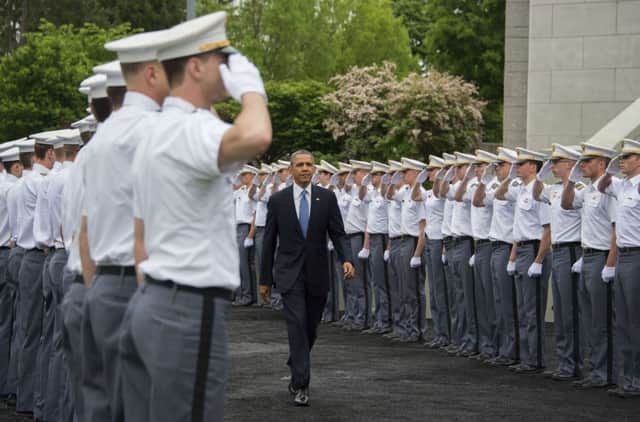Obama defends restraint after ‘long season of war’


Mr Obama’s speech signalled a concerted effort by the White House to push back against critics who contend that the president’s approach to global problems has been too cautious and has emboldened adversaries in Syria, Russia and China.
This is a criticism that deeply frustrates the president and his advisers, who say Mr Obama’s efforts to keep the United States out of more military conflicts are in line with the views of the American public.
Advertisement
Hide AdAdvertisement
Hide AdStanding before the latest class of officers graduating from the US Military Academy at West Point, in New York state, Mr Obama said: “I would betray my duty to you, and to the country we love, if I sent you into harm’s way simply because I saw a problem somewhere in the world that needed fixing, or because I was worried about critics who think military intervention is the only way for America to avoid looking weak.”
Even as the US emerges from the two wars that followed the 11 September 2001, attacks, Mr Obama said terrorism remains the most direct threat to American security. But he argued that as the threat has shifted from a centralised al-Qaeda to an array of affiliates, the American response must change too.
Rather than launching large-scale military efforts, Mr Obama called for more partnering with countries where terrorist networks seek a foothold. That effort includes a new $5 billion (about £3bn) fund to help countries fight terrorism and to expand intelligence, surveillance, reconnaissance, special operations and other activities.
Mr Obama cast the civil war in Syria as more of counter-terrorism challenge than a humanitarian crisis. He defended his decision to keep the US military out of the conflict, but said he would seek to increase support for the Syrian opposition, as well as for neighbouring countries including Jordan, Lebanon, Turkey and Iraq that have faced an influx of refugees and fear the spread of terrorism.
He said: “In helping those who fight for the right of all Syrians to choose their own future, we also push back against the growing number of extremists who find safe haven in the chaos.”
One plan being considered by the White House is a project to train and equip members of the Free Syrian Army on tactics, including counter-terrorism.
The crisis in Syria continues to be among the most vexing problems facing the White House. Mr Obama contends that an agreement to strip Syria of its chemical weapons was a success, but the deal has done nothing to end the civil war, which is now in its fourth year and has left more than 160,000 people dead.
The president’s speech came a day after he outlined plans to wind down America’s war in Afghanistan by the end of 2016. The blueprint calls for keeping 9,800 troops in the country for training and counter-terrorism after combat missions end later this year, withdrawing them within two years.
Advertisement
Hide AdAdvertisement
Hide AdThe drawdown plan is central to Mr Obama’s long-standing pledge to bring to a close both the Afghan conflict and the Iraq war, which ended in late 2011. He was greeted by cheers from the graduating cadets when he noted that they had the distinction of being “the first class to graduate since 9/11 who may not be sent into combat in Iraq or Afghanistan”.
But Mr Obama said the US would continue to use military force on its own “when our core interests demand it – when our people are threatened, when our livelihood is at stake, or when the security of our allies is in danger”.
He also continued to defend the US’s use of drone strikes in places such as Yemen and Somalia, but called for increased transparency about the programme.